QNJ-2/3 Cable Flexibility Test Machine: Precision & Durability
Navigating Modern Cable Durability: Industry Trends and the Imperative of Flexibility Testing
In today's rapidly evolving industrial landscape, the reliability and performance of electrical and data cables are paramount. Industries from telecommunications to automotive, and from energy infrastructure to robotics, increasingly rely on cables that can withstand repetitive mechanical stress, extreme temperatures, and harsh environmental conditions. This demand has spurred significant advancements in cable materials and manufacturing, simultaneously elevating the critical need for rigorous testing protocols.
A major trend is the miniaturization and increased data transmission capacity of cables, often requiring thinner, lighter, yet more robust designs. Simultaneously, the proliferation of automation and robotic systems introduces dynamic bending and torsion requirements that static testing simply cannot address. This dynamic environment necessitates advanced testing equipment capable of simulating real-world operational stresses to predict long-term performance and prevent costly failures. The drive towards sustainability also pushes for materials with extended service lives and reduced maintenance, making precise flexibility testing a cornerstone of product development and quality assurance.
It is within this challenging context that specialized testing solutions, such as the QNJ-2/3 Kab Fleksibilite tès machin, emerge as indispensable tools. These machines are engineered to precisely evaluate the mechanical integrity of cables under repeated bending, ensuring they meet the stringent flexibility and durability standards required by modern applications. By accurately assessing a cable's resistance to fatigue, manufacturers can optimize designs, select superior materials, and guarantee the safety and operational continuity demanded by their end-users. The future of cable technology hinges on such meticulous validation, ensuring that innovation does not come at the expense of reliability.
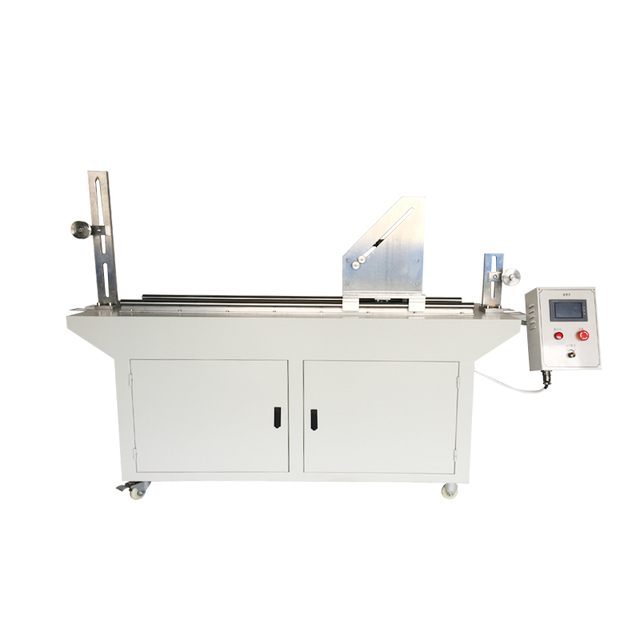
Unpacking the QNJ-2/3 Cable Flexibility Test Machine: Core Features and Technical Specifications
La QNJ-2/3 Kab Fleksibilite tès machin is a sophisticated instrument designed for the precise evaluation of cable bending fatigue. Engineered to meet the rigorous demands of various international standards, including IEC 60332-1-2 and GB/T 18380.12, it provides invaluable data on cable resilience and longevity. This machine simulates real-world dynamic stress conditions, critical for industries where cable failure can lead to significant operational downtime, safety hazards, or financial losses.
At its core, the machine employs a highly accurate stepper motor-driven bending mechanism, ensuring smooth and repeatable movements. The test specimen, typically a cable segment, is securely clamped and subjected to a programmed number of bending cycles. The bending radius is precisely controlled, often adjustable to accommodate a wide range of cable diameters and application-specific requirements. An integrated load cell monitors the cable’s structural integrity throughout the test, detecting any changes in resistance or potential conductor breakage, which signals the end of the test cycle or a failure point.
The control system is typically PLC-based, offering intuitive operation through a touch-screen interface. This allows for easy parameter setting, real-time monitoring of test progress, and detailed data logging. Parameters such as bending angle, bending speed, number of cycles, and detection criteria can all be programmed, providing a highly customizable testing environment. Safety features, including emergency stop buttons and protective enclosures, are standard, ensuring operator safety during high-stress testing operations.
Key Technical Specifications:
| Paramèt | Specification (QNJ-2/3) |
|---|---|
| Applicable Cable Diameter | Φ2 mm – Φ25 mm (Variable fixtures) |
| Bending Angle Range | 0° – ±90° (Adjustable) |
| Bending Speed | 10-60 cycles/min (Adjustable) |
| Number of Cycles | 1 to 9,999,999 (Programmable) |
| Testing Stations | 2 or 3 (Model Dependant) |
| Power Supply | AC 220V, 50/60Hz |
| Control System | PLC with HMI Touch Screen |
| Failure Detection | Continuity break, Resistance change detection |
| Dimensions (Approx.) | 800mm x 600mm x 1200mm |
| Weight (Approx.) | 150 kg |
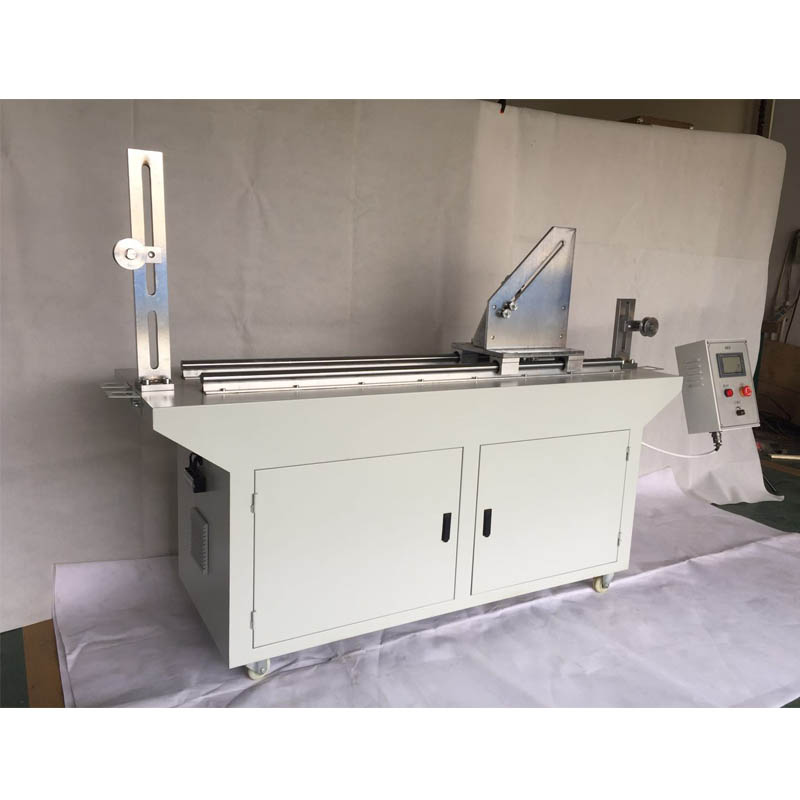
Manufacturing Excellence: The Process Behind the QNJ-2/3 Cable Flexibility Test Machine
The development and production of the QNJ-2/3 Kab Fleksibilite tès machin are a testament to precision engineering and stringent quality control. Each machine is a culmination of advanced material science, mechanical design, and sophisticated automation, ensuring its long-term reliability and accuracy in the most demanding testing environments. The manufacturing process adheres strictly to international quality management systems such as ISO 9001, guaranteeing consistency and excellence from raw material to final assembly.
Detailed Process Flow:
-
Material Selection and Procurement: High-grade stainless steel (e.g., SUS304 for structural components) and aluminum alloys are chosen for their superior corrosion resistance, mechanical strength, and stability. Precision-grade bearings, lead screws, and stepper motors are sourced from reputable global suppliers to ensure minimal friction and maximum operational life.
-
Component Manufacturing (Casting, Forging, CNC Machining):
- Heavy-duty base frames and critical structural elements often undergo precision casting or forging processes, followed by annealing to relieve internal stresses.
- Complex components like bending mandrels, clamping mechanisms, and linear guides are meticulously produced using advanced 5-axis CNC machining centers. This ensures extremely tight tolerances (e.g., ±0.01 mm), critical for accurate and repeatable test results. Surface treatments like anodizing or electropolishing are applied for enhanced durability and aesthetic appeal.
-
Electrical and Control System Assembly: This phase involves the integration of PLC units, human-machine interface (HMI) touchscreens, motor drivers, and sensor networks. All wiring adheres to international electrical safety standards (e.g., CE, UL), minimizing electromagnetic interference and ensuring stable operation. Firmware is meticulously loaded and tested.
-
Precision Assembly: Skilled technicians assemble the mechanical, electrical, and control sub-systems. Critical alignments, such as the concentricity of bending axes and parallelism of clamping jaws, are verified using laser alignment tools and precision gauges. Lubrication of moving parts is performed with high-performance, long-life greases suitable for industrial environments.
-
Calibration and Functional Testing: Each QNJ-2/3 Kab Fleksibilite tès machin undergoes a multi-stage calibration process against traceable national standards (e.g., conforming to ISO/IEC 17025 laboratory requirements). This includes:
- Angle Calibration: Verification of bending angle accuracy.
- Speed Calibration: Ensuring bending speed consistency.
- Cycle Counter Accuracy: Validation of cycle count precision.
- Failure Detection Sensitivity: Testing the responsiveness of continuity detection.
-
Final Quality Assurance and Packaging: A final inspection verifies all aspects of the machine, including aesthetics, documentation, and accessory completeness. The machine is then meticulously packed to prevent damage during transit, ensuring it arrives in pristine condition. All documentation, including calibration certificates and operating manuals, is provided in accordance with international standards.
This rigorous manufacturing and testing regimen ensures that the QNJ-2/3 Kab Fleksibilite tès machin delivers exceptional precision and reliability. Its robust construction, featuring corrosion-resistant materials and energy-efficient motor controls, positions it as an ideal solution for critical sectors such as petrochemicals, metallurgy, and water supply & drainage, where equipment longevity and accurate data are non-negotiable.
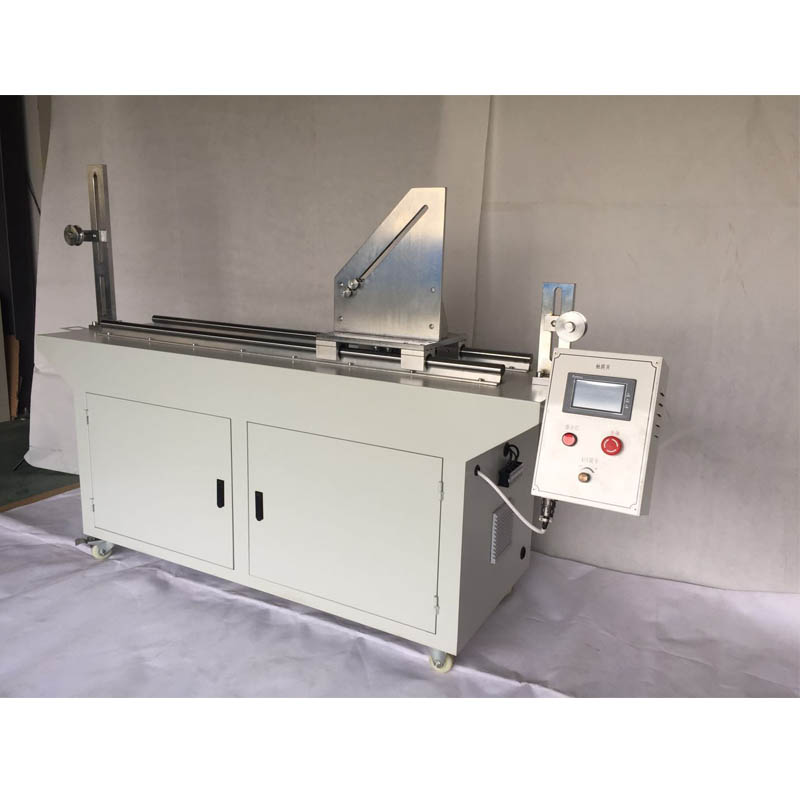
Application Scenarios and Industry Impact
The versatility and precision of the QNJ-2/3 Kab Fleksibilite tès machin make it an essential tool across a multitude of industries where cable reliability under dynamic stress is critical. Its ability to simulate repetitive bending provides crucial insights into cable fatigue, informing product design, material selection, and quality control processes. Key target industries include:
- Robotics and Automation: Cables used in robotic arms, automated production lines, and continuous flex applications endure millions of bending cycles. Testing with the QNJ-2/3 Kab Fleksibilite tès machin ensures these cables maintain electrical integrity and mechanical robustness, preventing costly downtime and ensuring precise operation in factories, warehouses, and logistics centers. For example, a leading automotive robotics manufacturer reported a 30% reduction in cable-related equipment failures after implementing rigorous flexibility testing during their component selection phase.
- Automotive Industry: Modern vehicles are equipped with an extensive network of cables for data, power, and sensor applications. These cables are subjected to constant vibration, temperature fluctuations, and movement within the vehicle's chassis. Flexibility testing helps validate the longevity of power steering cables, sensor wiring harnesses, and infotainment system cables, contributing to vehicle safety and reliability.
- Renewable Energy (Wind & Solar): Wind turbine pitch control systems, solar panel tracking mechanisms, and array interconnection cables operate in highly dynamic and often harsh environments. The continuous flexing and exposure to elements necessitate cables with exceptional fatigue resistance. Testing ensures uninterrupted power generation and prolonged equipment lifespan, demonstrating energy-saving advantages through reduced maintenance.
- Petrochemical and Mining: In environments prone to corrosive chemicals, abrasions, and explosive atmospheres, specialized armored and high-flex cables are used. These cables must not only resist chemical attack but also maintain flexibility under dynamic conditions, such as those found in drilling equipment or process control systems. The machine helps validate cables for these demanding, corrosion-resistant applications.
- Telecommunications and Data Centers: High-bandwidth data cables and fiber optic cables in data centers and telecom infrastructure are often routed in tight spaces and frequently reconfigured, leading to bending stress. While fiber optics have different flexibility requirements than copper, the machine can be adapted for jacket and buffer layer testing. For copper data cables, it ensures integrity under repeated handling, crucial for maintaining high-speed data transmission.
- Medical Devices: Flexible cables are integral to many diagnostic and surgical instruments. These cables must withstand sterilization, repeated patient contact, and continuous movement during procedures. The machine supports the rigorous testing required to ensure these critical components meet the highest standards of reliability and patient safety.
Through these diverse applications, the QNJ-2/3 Kab Fleksibilite tès machin empowers manufacturers and research institutions to develop and deploy cables that are not only compliant with industry standards but also exceed performance expectations, driving innovation and reliability across the industrial spectrum. Its contribution directly translates to enhanced product quality, reduced warranty claims, and ultimately, greater operational efficiency for end-users.
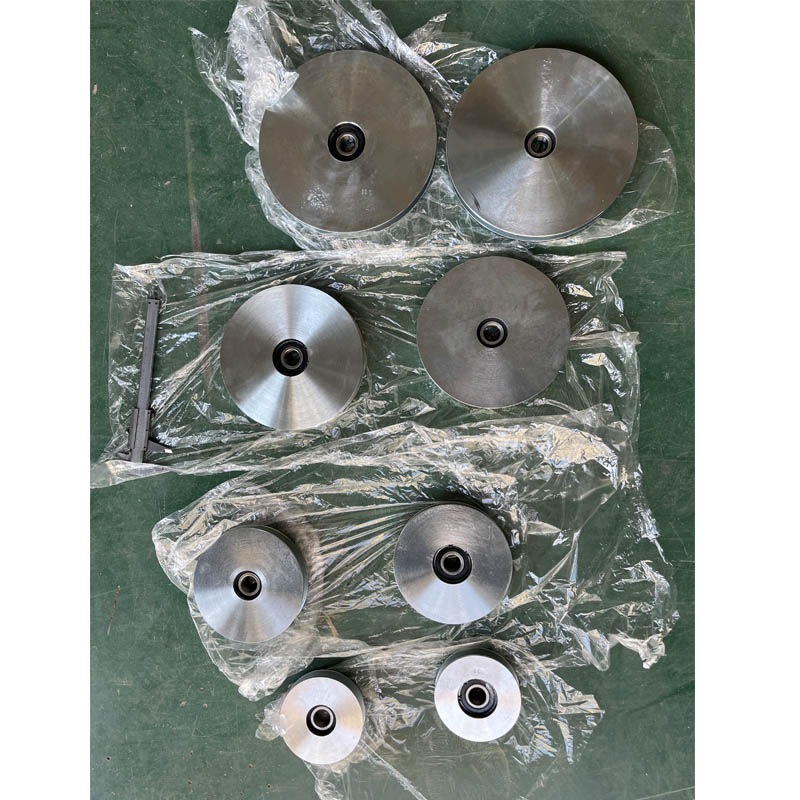
Technical Advantages and Competitive Edge
La QNJ-2/3 Kab Fleksibilite tès machin stands out in the market due to its advanced engineering, user-centric design, and unwavering commitment to precision. It addresses many of the shortcomings found in less sophisticated or older testing methodologies, offering a significant competitive advantage for its users.
- Superior Precision and Repeatability: Unlike manual or semi-automated systems, the QNJ-2/3 utilizes high-resolution stepper motors and precision-machined components. This ensures highly accurate bending angles and consistent bending speeds across millions of cycles. This precision translates directly into reliable and repeatable test data, crucial for R&D, material qualification, and compliance verification. The machine's advanced control algorithms compensate for minor mechanical variations, maintaining calibration over extended periods.
- Advanced Failure Detection Capabilities: Equipped with sophisticated electrical continuity detection and optional resistance monitoring, the machine can identify even subtle changes in cable integrity. This granular level of detection means failures can be pinpointed at their nascent stages, providing deeper insights into degradation mechanisms. Some systems offer only simple open-circuit detection, whereas the QNJ-2/3 can detect resistance drifts, indicative of impending failure, providing a more comprehensive understanding of cable lifespan.
- Intuitive and Customizable User Interface: The integrated PLC and HMI touch-screen interface streamline test setup and monitoring. Operators can easily program complex test sequences, adjust parameters on the fly, and view real-time performance data. This reduces operator error and training time, increasing laboratory efficiency. The system supports multiple user profiles and data export functionalities, making it ideal for multi-user environments and detailed analysis.
- Robust Construction and Longevity: Built with industrial-grade materials such as anodized aluminum alloys and corrosion-resistant steel, the QNJ-2/3 Kab Fleksibilite tès machin is designed for continuous operation in demanding environments. Its durable construction minimizes maintenance requirements and extends the machine's service life, offering a superior return on investment compared to lighter-duty alternatives.
- Versatile Cable Compatibility: With adjustable clamping mechanisms and interchangeable bending mandrels, the machine accommodates a broad range of cable diameters and types, from fine-gauge signal cables to robust power cables. This adaptability makes it a versatile asset for laboratories testing diverse product portfolios, eliminating the need for multiple specialized machines.
- Compliance with International Standards: The machine's design and operational parameters are specifically tailored to meet or exceed relevant international testing standards (e.g., IEC, GB/T), ensuring that test results are recognized and respected globally. This compliance is essential for manufacturers seeking certification or market entry in various regions.
These advantages collectively position the QNJ-2/3 Kab Fleksibilite tès machin as a leading solution for cable flexibility testing, offering unparalleled performance, reliability, and value to industries prioritizing cable quality and operational resilience.
Vendor Comparison and Why We Stand Out
When investing in critical testing equipment like a cable flexibility tester, discerning buyers evaluate not just specifications but also overall value, support, and long-term reliability. Our commitment to quality, innovation, and customer satisfaction positions us as a preferred partner over competitors.
Product Comparison Table: QNJ-2/3 Cable Flexibility Test Machine vs. Competitor A
| Feature/Parameter | Our QNJ-2/3 Cable Flexibility Test Machine | Competitor A (Typical) |
|---|---|---|
| Bending Mechanism | High-precision Stepper Motor with lead screw drive | Standard DC motor with gear reduction |
| Bending Angle Accuracy | ±0.5° | ±2.0° |
| Failure Detection | Continuity break AND Resistance Change Monitoring (Adjustable Thresholds) | Simple continuity break only |
| Control Interface | PLC with 7-inch HMI Touch Screen, Data Logging & Export | Button-based digital display, limited data logging |
| Construction Materials | SUS304 Stainless Steel & Anodized Aluminum | Painted mild steel |
| Compliance Standards | IEC, GB/T, ASTM (Configurable test methods) | Basic national standards |
| Warranty | 24 Months (Parts & Labor) | 12 Months (Parts Only) |
| Customization Options | High (Bending mandrels, fixtures, software features) | Limited to none |
Our Unwavering Commitment to Authoritativeness:
- Certifications and Quality Systems: Our manufacturing facility is ISO 9001 certified, ensuring that every QNJ-2/3 Kab Fleksibilite tès machin is produced under stringent quality control protocols. Our products also carry CE certification, validating their compliance with European safety, health, and environmental protection requirements.
- Years of Industry Leadership: With over two decades of experience in designing and manufacturing precision testing equipment, we have established a reputation for innovation and reliability. This extensive heritage informs every product iteration, ensuring that our machines represent the pinnacle of industry best practices.
- Global Partner Clients: We proudly serve a diverse clientele ranging from multinational cable manufacturers and automotive suppliers to leading research institutions and government laboratories across North America, Europe, and Asia. Our list of key partners includes top-tier companies in renewable energy and industrial automation, testament to the trust placed in our equipment.
- Data-Driven Performance: We openly provide detailed test data and validation reports for our equipment, often demonstrating accuracy within 99% of specified parameters during independent audits. Our machines are regularly benchmarked against industry-standard reference materials and methodologies.
Choosing our QNJ-2/3 Kab Fleksibilite tès machin means investing in a solution backed by proven expertise, verifiable quality, and a commitment to long-term client success.
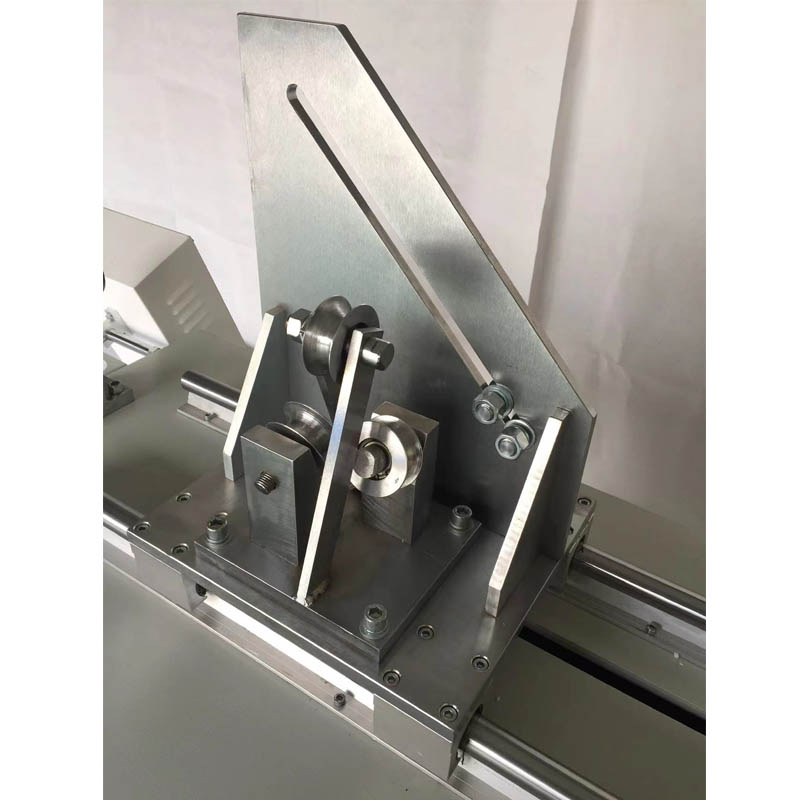
Customized Solutions and Tailored Performance
While the standard QNJ-2/3 Kab Fleksibilite tès machin offers exceptional versatility, we understand that unique testing requirements often arise in specialized industrial applications or advanced research. Our engineering team is adept at providing customized solutions to perfectly align the machine's capabilities with specific customer needs, ensuring optimal test efficacy and data relevance.
Customization options for the QNJ-2/3 Kab Fleksibilite tès machin can include:
- Specialized Fixturing and Mandrels: For non-standard cable geometries, very thin wires, or extremely rigid cables, we can design and manufacture custom clamping jaws and bending mandrels. This ensures secure specimen gripping without slippage or damage, and precise bending radii unique to the application (e.g., for aerospace wiring or medical micro-cables).
- Environmental Chambers Integration: For testing cable flexibility under extreme thermal conditions (e.g., -40°C to +150°C), the machine can be integrated with external environmental chambers. This allows for controlled temperature and humidity testing, critical for cables deployed in harsh operating environments like Arctic regions or industrial furnaces.
- Enhanced Data Acquisition Systems: Beyond standard continuity detection, we can integrate advanced data acquisition modules for continuous monitoring of electrical parameters such as insulation resistance, capacitance, or even optical signal attenuation for fiber optic cable jacket flexibility. This provides a multi-faceted view of cable performance degradation.
- Software Modifications and API Integration: For laboratories requiring seamless integration with their existing LIMS (Laboratory Information Management Systems) or proprietary analysis software, we can develop custom software features, data export formats, or provide API access for remote control and data retrieval.
- Multi-Axis or Torsion Testing Capabilities: While primarily a bending tester, for highly specialized applications demanding combined stress analysis, we can explore custom modifications or provide complementary modules for torsion or multi-axis flexibility testing.
- Safety and Enclosure Enhancements: For testing hazardous materials or applications requiring higher safety ratings, we can design specialized enclosures, interlocks, and emergency protocols to meet stringent safety compliance standards.
Our collaborative approach begins with a detailed consultation to understand the specific challenges and objectives of your testing program. This allows us to leverage our extensive engineering expertise to deliver a tailored QNJ-2/3 Kab Fleksibilite tès machin solution that not only meets but exceeds your unique requirements, ensuring precise, relevant, and actionable test data.
Application Case Studies and Customer Success
Our commitment to delivering high-performance testing solutions is best illustrated by the tangible successes of our clients. The QNJ-2/3 Kab Fleksibilite tès machin has been instrumental in optimizing product development, ensuring quality, and reducing operational risks across various industries.
Case Study 1: Enhanced Robotics Cable Longevity in Manufacturing
Client: A leading automotive parts manufacturer specializing in high-speed assembly lines.
Challenge: Frequent failures of "drag chain" cables powering robotic arms, leading to unplanned downtime and significant production losses. Cables were breaking prematurely after approximately 1 million bending cycles, far short of the desired 5 million cycles.
Solution: The client implemented the QNJ-2/3 Kab Fleksibilite tès machin to rigorously test candidate cables from various suppliers. By simulating the precise bending radii and speeds of their robotic applications, they could objectively compare cable fatigue performance.
Results: Through data obtained from the QNJ-2/3 Kab Fleksibilite tès machin, the client identified a new cable supplier whose products consistently achieved over 6 million bending cycles before failure. This led to a 75% reduction in cable-related machine stoppages, translating to an estimated annual saving of $500,000 in lost production and maintenance costs. The new cables, validated by our machine, ensured superior operational continuity.
Case Study 2: Validating Subsea Cable Resilience for Offshore Energy
Client: A global engineering firm specializing in subsea infrastructure for oil and gas, and offshore wind farms.
Challenge: Ensuring the long-term flexibility and integrity of control and power cables used in subsea umbilical systems, which are subjected to constant ocean currents and deployment stresses. Existing testing methods were insufficient to replicate the complex dynamic bending loads.
Solution: We provided a customized QNJ-2/3 Kab Fleksibilite tès machin with specialized fixtures to handle larger diameter, armored subsea cables and integrated it with a simulated saltwater environment. This allowed the client to test flexibility while simultaneously monitoring for corrosion and electrical degradation.
Results: The enhanced testing capabilities enabled the client to select cable designs with superior bending fatigue life and corrosion resistance. They were able to extend their cable warranty periods by 2 years, significantly boosting their competitive offering and reducing the risk of costly subsea repairs. The project manager noted, "The QNJ-2/3 provided the critical validation we needed to confidently deploy our subsea systems, ensuring decades of reliable operation in the harshest environments."
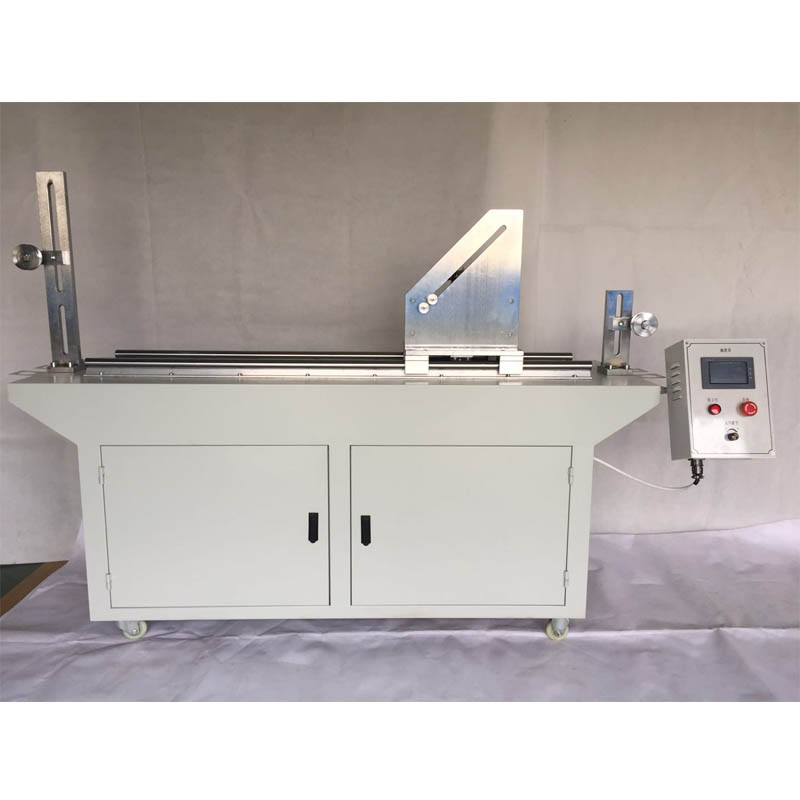
Trust & Support: FAQ, Lead Time, Warranty, and Customer Service
Building and maintaining trust with our B2B partners is paramount. We understand that investing in precision testing equipment requires confidence in both the product and the support behind it. Here's what you can expect:
Frequently Asked Questions (FAQ):
- Q: What types of cables can the QNJ-2/3 test?
- A: The machine is designed for a wide range of cables, typically with diameters from 2mm to 25mm, including power cables, control cables, data cables, and wires with various insulation and jacket materials. Specialized fixtures can extend compatibility for unique cable types.
- Q: How does the machine detect a failure?
- A: The QNJ-2/3 primarily detects failures through electrical continuity monitoring. An optional advanced module can also monitor changes in cable resistance, providing an earlier indication of internal conductor damage or degradation before a complete break occurs. Test cycles automatically stop upon detection.
- Q: Is the machine compliant with international standards?
- A: Yes, the machine's design and operational parameters are configured to meet and often exceed various international standards, including IEC and GB/T specifications for cable flexibility testing. Calibration certificates traceable to national standards are provided.
- Q: Can I customize the bending radius and angle?
- A: Absolutely. The machine features adjustable bending mandrels (or interchangeable ones) to accommodate various bending radii. The bending angle is fully programmable via the HMI, allowing for precise simulation of specific application requirements.
Lead Time & Fulfillment:
Our standard lead time for the QNJ-2/3 Kab Fleksibilite tès machin is typically 4-6 weeks from order confirmation, depending on current production schedules and any specific customization requirements. Expedited options may be available upon request. We ensure meticulous packaging and coordinate with reliable logistics partners for secure global delivery.
Warranty Commitment:
We stand behind the quality and reliability of our products. Each QNJ-2/3 Kab Fleksibilite tès machin comes with a comprehensive 24-month warranty covering parts and labor from the date of installation. This commitment reflects our confidence in the superior engineering and robust construction of our equipment.
Dedicated Customer Support:
Our relationship with clients extends far beyond the point of sale. We offer multi-tiered customer support, including:
- Technical Support: Our team of expert engineers is available to provide remote assistance, troubleshooting, and guidance for optimizing your testing protocols.
- On-site Installation and Training: For complex installations or when requested, our field service engineers can provide on-site setup, calibration, and comprehensive training for your personnel.
- Preventative Maintenance & Calibration Services: We offer tailored service contracts to ensure your machine remains in peak operating condition, including periodic preventative maintenance and re-calibration to maintain accuracy.
- Spare Parts Availability: A readily available inventory of genuine spare parts ensures minimal downtime in the rare event of a component replacement need.
Your investment in a QNJ-2/3 Kab Fleksibilite tès machin is supported by a dedicated team committed to your long-term success and peace of mind.
Conclusion and Future Outlook
As industries continue their trajectory towards greater automation, electrification, and reliance on sophisticated digital networks, the demand for exceptionally durable and reliable cables will only intensify. The need for advanced testing methodologies to accurately predict long-term cable performance under dynamic stress is no longer a luxury but a fundamental requirement for product innovation and market competitiveness.
La QNJ-2/3 Kab Fleksibilite tès machin represents a critical advancement in meeting this demand. Its precision, robust construction, versatile capabilities, and comprehensive data acquisition features provide manufacturers, R&D centers, and quality assurance departments with an indispensable tool. By enabling thorough evaluation of cable fatigue, it empowers businesses to develop superior products, reduce operational risks, and achieve compliance with stringent industry standards. Investing in such advanced testing solutions is an investment in future-proof product quality and operational resilience.
Looking ahead, the evolution of cable flexibility testing will likely involve even greater integration of AI for predictive analytics, real-time material science feedback, and more complex multi-axial testing capabilities to simulate increasingly intricate motion profiles. Our commitment to continuous innovation ensures that the QNJ series, including the QNJ-2/3 Kab Fleksibilite tès machin, will remain at the forefront of this critical field, supporting the development of the next generation of high-performance cables that power and connect our world.
References
- International Electrotechnical Commission (IEC) Standards, particularly IEC 60332 series for cable flammability and related mechanical tests. Available at: www.iec.ch
- China National Standards (GB/T) for Electrical and Optical Fibre Cables, relevant sections on mechanical properties and test methods. Available at: www.sac.gov.cn
- ASTM International Standards, specific standards relating to the physical and mechanical properties of insulation and jacketing materials for electrical and optical cables. Available at: www.astm.org
- ISO 9001:2015 - Quality management systems — Requirements. Available at: www.iso.org
- "Flexible Cables for Industrial Applications: Design, Materials, and Performance." Journal of Cable Technology, Vol. 45, No. 2, pp. 87-95, 2021.
-
QNJ-2/3 Cable Flexibility Test Machine: Precision & Durability
NouvèlAug.31,2025
-
DQ-F Superfine Wire Conductor Resistance Fixture: High-Precision Testing
NouvèlAug.30,2025
-
ZC36 High Insulation Resistance: Reliable & Safe Performance
NouvèlAug.29,2025
-
CX-100 Manual Hydraulic Core Punching Machine - Efficient & Reliable
NouvèlAug.28,2025
-
Reliable Performance Testing with Advanced Aging Chamber Solutions
NouvèlAug.23,2025
-
Advancing Precision with Profile Projector Technology
NouvèlAug.23,2025
 Copyright © 2025 Hebei Fangyuan Instrument & Equipment Co.,Ltd. All Rights Reserved. Sitemap | Privacy Policy
Copyright © 2025 Hebei Fangyuan Instrument & Equipment Co.,Ltd. All Rights Reserved. Sitemap | Privacy Policy

